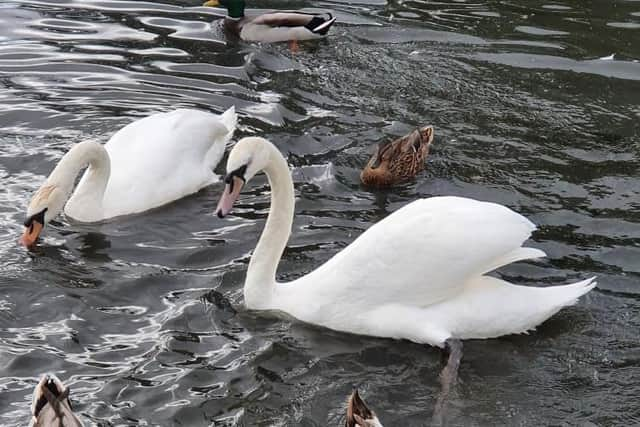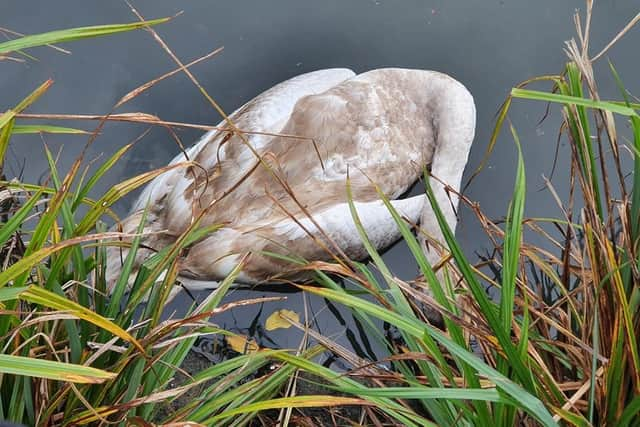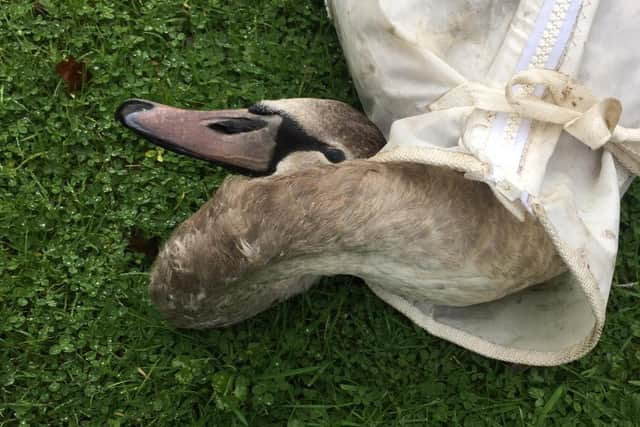Stanley Park lake cordoned off after three birds die of suspected avian flu
and live on Freeview channel 276
The birds were found in Blackpool yesterday and were reported to Blackpool Council and the Department for Environment, Food and Rural Affairs.
This morning, another dead swan was recovered from the lake by a fisherman.
Advertisement
Hide AdAdvertisement
Hide AdJustin Greenhalgh, of Brambles Wildlife Rescue in South Shore, said: "We went on Friday to Stanley Park and saw one or two swans showing signs of bird flu, however, we couldn't at this time intervene as the way DEFRA operates makes it quite difficult. They will only attend when there is a report of one deceased, at which point they will come and take it away for autopsy.


"On Saturday we went back after having reports from members of the public who found a cygnet in a bad condition. I then contacted Blackpool Council and relayed everything to them and there was a discussion then to possibly cordon the lake off, however at that point we had not had an official case.
"Unfortunately, leading from there, on Sunday afternoon one swan was found out in the middle of the lake deceased, and also a Canada goose was found deceased at the lakeside.
"Blackpool Council have been very proactive and sent out the environmental team to recover the bodies."
Advertisement
Hide AdAdvertisement
Hide AdA Blackpool Council spokesman said: "Three swans have died over the weekend and have been removed from the Stanley Park. Although it is not confirmed we suspect it be avian flu due to the symptoms they were displaying beforehand.


"As a precautionary measure we have cordoned off the lake and put signage in place. We have also notified DEFRA."
A bird flu prevention zone was declared across Great Britain last week to stop the spread of the disease following outbreaks in Scotland and Wales.
The potentially deadly virus, which rarely affects humans, was confirmed at a farm in Salwick on the outskirts of Preston on Saturday. A temporary surveillance zone was set up spanning 10km in every direction from the farm, reaching Bamber Bridge, Lytham, Catterall and Much Hoole, South Ribble.
Advertisement
Hide AdAdvertisement
Hide AdAll birds at the farm will be culled to prevent further spread of the disease.


READ: Disease control zone declared in Preston, South Ribble and Fylde after Bird Flu outbreak at poultry farmOn Sunday, November 7, a swan was found dead on the Japanese Pond at Cypress Point, Lytham, and another was found on the main pond nearby a day later. A third swan was taken to the Veterinary Health Centre on Greenways, where it was euthanised.
READ: Three swans die in suspected bird flu case in LythamTwo more swans are reported to have died in the area over the weekend.
Meanwhile, another cygnet with a suspected case of bird flu was euthanised after being picked up from the pond near the Four Seasons Eatery in Staining on Friday.
Advertisement
Hide AdAdvertisement
Hide AdBailey Lister, who runs Hugo's Small Animal Sanctuary on Smithy Lane, said: "A concerned customer called us on Friday, around 2.30pm. We went down, retreived the swan from the water and then took it to the Veterinary Health Centre, where it was euthanised.
"The swan was spinning around in circles, practically drowning herself, and couldn't keep her head above the water. The neck was twisting, which is a telltale sign of bird flu.
"After it was euthanised, it was sent off to DEFRA for post-mortem.
"We have not had any reported of suspected bird flu in the area since then, but because of the severity of this case and how close it is to our rescuem we've had to make the decision not to take any birds in until DEFRA deems it safe, because we have to protect the birds we already have.
Advertisement
Hide AdAdvertisement
Hide Ad"It's heartbreaking because we were called out to a crow yesterday with a broken wing, which had to be euthanised. Your brain tells you one thing but your heart tells you another. We want to take in these animals, but we can't."
Blackpool Council recently updated the way it responds to outbreaks of animal disease following the deaths of nine swans in the resort from bird flu last November.
The affected birds all lived at Stanley Park, with council officers cordoning off the lake following the outbreak.
In February this year, the lake was cordoned off for nearly two weeks after a further case of suspected bird flu in another swan.
Advertisement
Hide AdAdvertisement
Hide AdAn internal audit found the controls in place for dealing with an animal health outbreak were 'inadequate'. A report to the council's audit committee said "a number of material risks" were identified and there was "significant improvement required."
It added: "Particular focus is around the need to have an up to date contingency plan, which factors in wider stakeholders and a requirement to ensuring roles and responsibilities are defined and that staff are appropriately trained."
In response to the criticism, town hall managers said they "will ensure that a contingency plan for managing exotic and notifiable disease is developed as a matter of urgency."
John Blackledge, director of community and environmental services at the council, told the meeting officers had responded well to the Avian flu outbreak in Stanley Park.
Advertisement
Hide AdAdvertisement
Hide AdBut the incident had highlighted the need to update the skills and knowlege of staff, with five members of staff having now had specialist training covering areas such as notification, types of disease, cordoning areas off and use of protective equipment.
SIGNS OF BIRD FLU
- Sudden death
- Lack of coordination
- Soft-shelled or misshapen eggs
- Lack of energy and appetite
- Diarrhoea
- Swelling
- Nasal discharge
- Decreased egg production
- Coughing, sneezing
If you see a dead bird, or suspect a bird is suffering from bird flu, call the DEFRA helpline on 03459 33 55 77, Monday to Friday, 8:30am to 5pm.
Thanks for reading. If you value what we do and are able to support us, a digital subscription is just £1 for your first month. Try us today by clicking here.
Comment Guidelines
National World encourages reader discussion on our stories. User feedback, insights and back-and-forth exchanges add a rich layer of context to reporting. Please review our Community Guidelines before commenting.